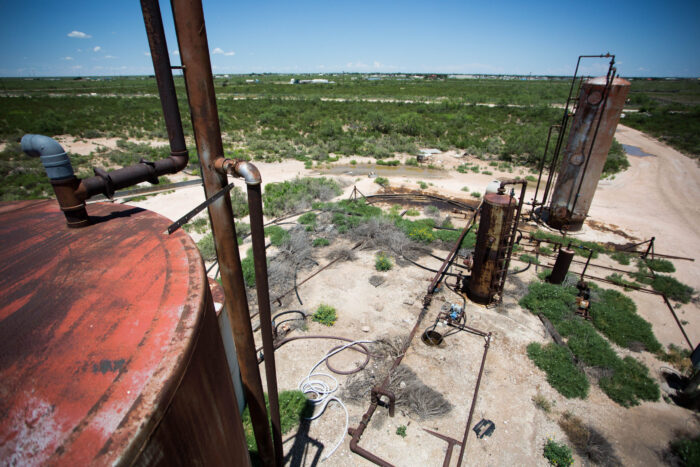Austin, TX — Yesterday, May 22, 2025, the Texas House passed Senate Bill 1150 in a near-unanimous vote to limit well plugging extensions for oil, gas, and injection wells. The bill is an important start to address the surplus of unplugged inactive oil and gas wells that pose risks to drinking water quality. Inactive wells may eventually become orphaned, with taxpayers on the hook to bear plugging costs.
An orphaned well is an unplugged oil, gas, or injection well for which no viable responsible party can be located, or where the owner is known but bankrupt. Inactive wells still have an active operator. There are nearly 117,000 inactive wells in Texas, and close to 9,000 orphaned wells.
“We applaud Senators Mayes Middleton, Cesar Blanco, and Royce West and Representatives Charlie Geren, Drew Darby, Armando Walle, and Eddie Morales for carrying this meaningful legislation,” said Julie Range, Policy Manager for Commission Shift Action.
Current law allows active operators to apply for an unlimited number of plugging extensions, year after year. SB 1150 reduces options for older inactive wells to get plugging extensions.
Older wells are more likely to have casing integrity problems, making them a higher risk for groundwater contamination and much more expensive to plug. The Railroad Commission’s cost of plugging orphaned wells increased by more than 30% since 2022 as a result of needing to respond to more emergency incidents.
“This bill helps ensure more operators will pay to plug their own wells, not taxpayers.” said Virginia Palacios, Executive Director of Commission Shift Action. “The orphaned wells list may grow in the short term because some operators never intended to plug their wells, and may not be able to come up with the money to do so. Over the long term, this law could be an important step toward curbing the unchecked growth of unplugged oil, gas, and injection wells,” said Palacios.
SB 1150 requires oil, gas, and injection wells to be plugged within 15 years of inactivity unless they meet certain criteria and are granted an extension for plugging. Older wells will only qualify for plugging extensions in four circumstances: 1) if the operator has a history of reactivating wells; 2) if the operator’s financial hardship warrants an extension; 3) if the operator posts a performance bond; or 4) if the well is included in a compliance plan approved by the commission. An important provision of the bill will require annual fluid or hydraulic pressure testing to check the well’s mechanical integrity.
“While this bill is better than the introduced version in that it has more guardrails, it also leaves a lot to the interpretation of the commission and has a lot of loopholes,” stated Schuyler Wight, a Pecos County rancher with many failing wells on his property. At the current rate of plugging by operators, all the wells on the inactive wells list would take 20 years to plug. SB 1150 allows operators to propose a compliance plan to plug or reactivate wells that are inactive for 15 years or more, and gives them until 2042 to come into compliance. Commission Shift Action advocated for all wells inactive 5 years or more to have to comply with the law. The option for operators to claim “financial hardship” to get a plugging extension could be abused.
Compliance plans will allow the commission to consider the operator’s history of violations before approving a plan, which was a recommendation made in the 2022 Commission Shift report Eliminating Orphan Wells and Sites in Texas. Commission Shift Action also recommended addressing plugging liability for prior operators when they transfer wells. This bill attempts to address that deficiency by requiring companies transferring wells to affirm they are operating in good faith and that the new operator will comply with the plugging rules.
Finally, the Railroad Commission will be required to provide an annual report on inactive wells, similar to the annual report it currently publishes on orphaned wells. This additional information will help the Legislature assess the effectiveness of the bill in reducing unplugged well populations.
Commission Shift Action applauds the Texas Legislature for passing this legislation and calls on the Governor to sign it into law. “Too often, landowners and neighbors of oil and gas development are stuck with the pollution consequences of unplugged wells,” stated Palacios, “The passage of SB 1150 is a step towards better oversight and preventing groundwater contamination.”
The bill now heads to a conference committee between both chambers to iron out differences.

Orphan well, carbon capture regulations top energy reform group’s legislative wish list